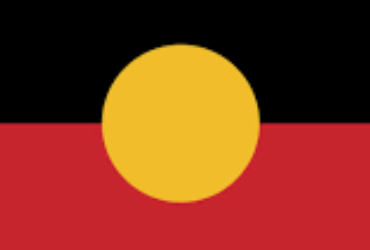
Research assesses effectiveness of cultural mentoring program
[supplied by Nicole Barlow]

(Back, from left) MLHD Co-Chief Investigator Peter Fernando, MLHD Project Lead Jasmin Pietsch, South Western Sydney LHD Nathaniel Alexander, Angela Damm from MLHD, Charles Sturt's Associate Professor Jessica Biles (Co- Chief Investigator), Luke Marks from Western NSW Health, MLHD Project Lead Rebecca Willis, Charles Sturt research assistant Nicolle Davies, UNSW Pro Vice-CHancellor Indigenous (Engagement and Research) Associate Professor Brett Biles and (front) Cultural Youth and Family Worker for Woomera Albury Derek Murray. Image: supplied
LATEST NEWS

(re)connection: Culture, Country & People To Open Mulgrave Gallery [supplied by Tanya Snelling] Cairns Festival is set to open with a compelling and culturally significant exhibition, (re)connection: Culture, Country & People, running from 23 August 2024 to 11 January 2025.

Tasmanian Aboriginal people are camping on parliament lawns demanding treaty [Adam Holmes, ABC] Tasmanian Aboriginal people and supporters have set up a camp outside the state's Parliament House, and say they won't move until the government commits to treaty legislation.

Malarndirri McCarthy’s rise from TV journalist to federal Indigenous Australians minister [Matt Garrick and Thomas Morgan, ABC] The former television journalist and NT government minister was on Sunday appointed Indigenous Australians minister by Anthony Albanese, taking over from outgoing minister Linda Burney.
Charles Sturt University is proud to announce a new research project aimed at assessing the feasibility and acceptability of a cultural mentoring initiative, the Deadly Aboriginal and Torres Strait Islander Nursing and Midwifery Mentoring program (DANMM).
DANMM is a First Nations designed and led comprehensive mentoring program that includes foundational modules, mentoring, and an online community of practice.
The research is using a pre-post evaluation to assess the feasibility, acceptability, resource implications and early indicators of the impact of implementing DANMM across four Local Health Districts (LHDs) in NSW, including the Murrumbidgee LHD, Western NSW LHD, Sydney LHD and Westmead Hospital in Western Sydney LHD.
Associate Professor in Nursing with the Charles Sturt School of Nursing, Paramedicine and Healthcare Sciences in Albury-Wodonga Dr Jessica Biles is one of the project leads.
Dr Biles said Charles Sturt is excited about the potential of this program to make a significant impact on holistic and culturally responsive healthcare for Aboriginal and Torres Strait Islander communities.
“We are curious as to whether program participation changes levels of workplace satisfaction, retention and experiences of cultural safety,” she said.
“Ultimately, we want to retain First Nations nurses and midwives in the workforce, which we know will have a direct impact to First Nations patients and consumers of health services.”
A meeting was held in Albury-Wodonga this week to discuss preliminary findings and seek advice from the program’s cultural governance group on the future of the mentoring group and application of the findings. The meeting was the second face-to-face cultural governance meeting for the program and was hosted by Albury-Wodonga Aboriginal Health Services, at Burranja Gallery.
The meeting was welcomed by Mr Derek Murray, Duduroa man and Cultural Youth and Family Worker for Woomera Albury and brought together key stakeholders from the University and health districts. The day also offered cultural activities, including spear throwing and weaving.
Mr Darren Wighton from Yulatiji Consulting worked with the research team creating an artwork that represents the research findings through art that will be gifted to Murrumbidgee Local Health District at the completion of the research.
The research methods draw on the Ngaa-bi-nya evaluation framework, using prompts to increase data collection and analysis of factors related to First Nations people’s ways of being, knowing and doing that influence the success of health and social support programs.
Government and health agencies have highlighted the importance of culturally appropriate and safe environments for First Nations people.
NSW Health prioritises workforce strategies that support First Nations people to enter and stay in the health workforce.
However, First Nations people are under-represented in the NSW nursing and midwifery workforce and retaining First Nations nurses and midwives remains challenging.
The DANMM project aims to address these critical issues of workforce cultural safety and retention.





.png)